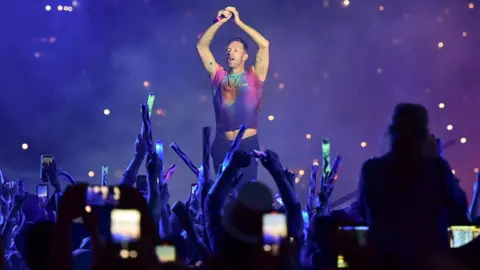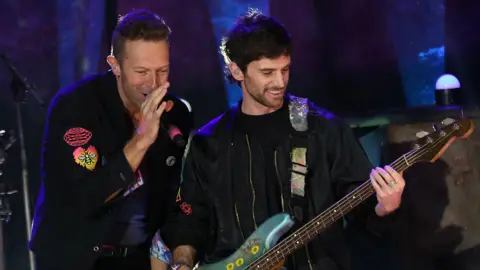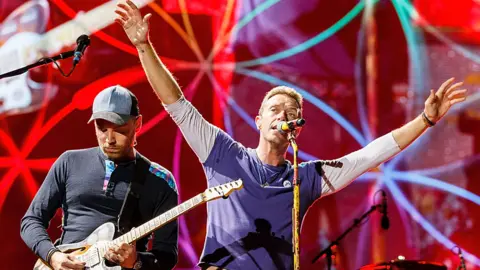Coldplay: Band ready for backlash over eco-friendly world tour
Coldplay's next tour will partly be powered by a dancefloor that generates electricity when fans jump up and down, and pedal power at the venues.
It's part of a 12-point plan to cut their carbon footprint, two years after the band pledged not to tour until they could do so in a more sustainable way.
Singer Chris Martin told the BBC in his first interview about the plans that fans will be on "kinetic flooring".
"When they move, they power the concert," he said.
"And we have bicycles too that do the same thing," Martin told BBC entertainment correspondent Colin Paterson.
 Getty Images
Getty Images"The more people move, the more they're helping. You know when the frontman says, 'We need you to jump up and down'?
"When I say that, I literally really need you to jump up and down. Because if you don't, then the lights go out."
'I don't mind backlash'
Coldplay will also plant a tree for every ticket sold. On their last tour in 2016-17, they played to 5.4 million people. That made it one of the biggest tours of all time, earning more than $500m (£380m).
The singer said he accepted there would be backlash about some of their activities, such as continuing to fly on private jets.
"I don't mind any backlash at all," he said. "We're trying our best, and we haven't got it perfect. Absolutely. We always have backlash for everything.
"And the people that give us backlash for that kind of thing, for flying, they're right. So we don't have any argument against that."
He admitted there was always the question of "why tour at all?", saying: "And that's where we don't really have any comeback except, we would really like to.
"We could stay at home and that may be better. But we want to tour and we want to meet people and connect with people - so try and do it in the cleanest way possible."
Martin said their goal for a few years' time is that they will have "slightly shifted the status quo of how a tour works".
 Getty Images
Getty ImagesThe British group announced a world tour on Thursday, starting in March in Costa Rica, which has one of the highest rates of renewable energy generation in the world.
The concerts will use electricity from batteries fuelled by fan power as well as solar energy, recycled cooking oil from local restaurants and mains power from 100% renewable sources where available, like in Costa Rica.
But the singer admitted they had not figured out how to cut the environmental impact of some some parts of touring.
"In some areas, there's still not enough possible, like how do you get people to a venue without consuming any power? That's still really hard," he said.
"Or flying - there's still a lot of offsetting we have to do, because even sustainable aviation fuel isn't good enough yet.
"So we know where we still have a long way to go. But in terms of the show itself, the whole show is powered from renewable energy, which is amazing."

How did all this happen?
By entertainment correspondent Colin Paterson
Amman, Jordan 2019. I am perched on wall in an ancient citadel interviewing Chris Martin about their latest album "Everyday Life". About half-way through, I throw out a fairly innocuous question about "How difficult is it to be an environmental band and do global tours?"
His reply rather took me by surprise. He revealed that they would not be touring again until they had worked out to do so in a way that was "not only sustainable but also be actively beneficial" to the environment.
By the next day his comments were making headlines around the world.
Fast forward two years and I'm sitting with the singer in a 15th-floor restaurant looking over London's rooftops. He has asked to speak to me as Coldplay are announcing an end to their self-imposed ban on touring, with their first tour in four and a half years.
He laughs as he explains, "Well last time we spoke, I sort of made that up when we were talking, because I was trying to think of something cool to say. And then it sort of became a headline. And then we thought, "Well that's actually what we really feel."
He explains how in the following days, the band started to be contacted by organisations and businesses with ideas and offers on to help them achieve their goals. Within weeks, they were employing two people full-time to work on how to make it happen.
The result is today's 12-point action plan.
"We aren't all the way there," admits Martin, "But we are way way further than we ever would have been, without you asking those questions."

In 2019, Martin said he "would be disappointed" if their next tour was not carbon neutral.
The 2022 tour, which will end in Glasgow next August, will have 50% lower carbon dioxide emissions than the 2016/17 tour, but will "still have a significant carbon footprint", according to the group's sustainability plan.
However, it adds that they will "draw down more CO2 than the tour produces by supporting projects based on reforestation, rewilding, conservation, soil regeneration, carbon capture/storage and renewable energy".
 Getty Images
Getty ImagesMartin said: "We wouldn't be announcing a tour unless we felt like we're far enough along that it's OK in our hearts, but we're definitely not finished."
Other measures in their plan include:
- The tour itinerary will minimise air travel, with sustainable aviation fuel used where flying is unavoidable
- Venues will be asked to use best environmental practices like installing aerated taps and low-flushing toilets to prevent water wastage
- The set will be built with materials picked for their environmental credentials, like bamboo
- Effects like lasers and lighting have been modified to be more energy efficient
- The LED wristbands worn by audience members will be made from 100% compostable, plant-based materials and will be reused every night
- An app will let fans plan their journeys to and from the show with lowest possible emissions, and they'll get a discount code to use at the venue if they commit to low-carbon travel
Chiara Badiali from Julie's Bicycle, a charity that advises the music industry on sustainability, said she was "very encouraged to see this level of commitment and a plan that is as comprehensive as the one they have pulled together".
She said: "They have looked at every area of the tour. I think that decision to trial out the battery technology is going to really help make a huge change.
"When we think about transforming the way the live music business works, we have some of the answers. But also, we don't always know what's going to work yet. Transformation is always trial and error.
"So a band going out and taking those risks and trying those things out, and being very open and sharing those things, is going to help the whole industry in the long run."


Does Coldplay's sustainability plan check out?
- Kinetic energy: The band will generate electricity from concertgoers stepping on tiles but it's hard to work out how much will be produced. There was an installation at the 2013 Paris Marathon which saw 40,000 runners generate 7kWh. Numbers in that range would meet only 2-3% of a typical Coldplay venue's energy needs.
- Flights: Coldplay will only use planes with sustainable aviation fuel. This is produced from waste fuel products and can produce 60% less emissions. But to take an example, if the band took a short-haul flight to a concert in Europe it might still produce 17 times more emissions than if Coldplay took the Eurostar.
- Trees: Coldplay will plant a tree for every ticket sold. Based on their last tour that would be 5.4 million trees around the world. For context, the UK is estimated to plant 20 million trees a year.
- Offsetting: Carbon offsetting such as tree planting is very challenging and has been criticised by some environmental groups as a way for wealthier nations and individuals to avoid taking the necessary steps to cut emissions.

